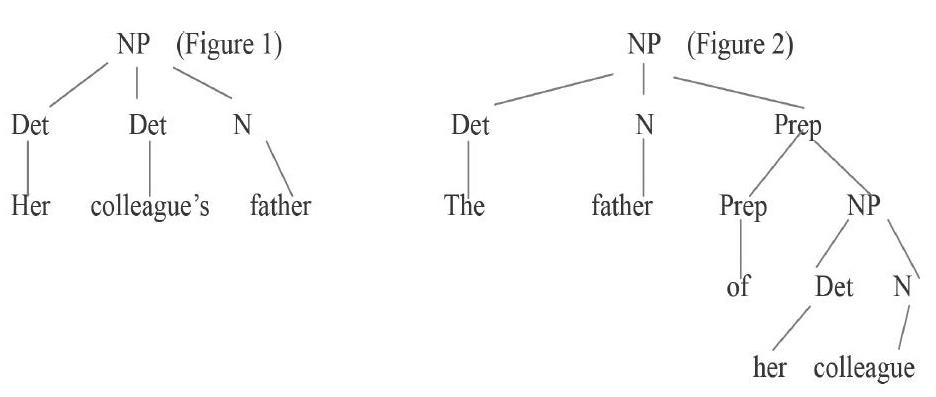S—Genitives, Of—Phrases and Choice between Them
2016-10-21陈潇晗张培丽
陈潇晗 张培丽
【Abstract】This paper analyzes the syntactic and semantic features of the s-genitives and of-phrases, and studies the factors which influence the choice between s-genitives and of-phrases, in order to provide a clear and systematic way of comparison and comprehension in these two constructions.
【Key words】S-Genitives; Of-Phrases; comparison
I. Introduction
In English, the possessive determiners and possessive pronouns are two major ways of indicating possession. “Another way to indicate possession in English is by inflecting a noun to turn it into a possessive determiner.”(Cowan, 2008). To make such inflection, regular singular nouns and irregular plural nouns are added s at the end of the words, such as the babys toy. For regular plural nouns and singular nouns ending with the sound s, only an apostrophe is added, as in the boys football.
The meaning of possession could also be conveyed by using the of-phrases. The position of the possessor and the thing possessed are changed comparing with the s form. Take “the mans name” versus “the name of the man” for example.
II. The Syntactic Analysis
Syntactically, we regard s-genitives as a determiner, but a possessive pronoun determiner would always precede a possessive noun determine(Figure 1).
The possessive with of, or of-phrase is generated as a noun phrase with a modifier prepositional phrase following the main noun, or in terminology, head noun (Figure 2).
To summarize, in both phrases we have a noun phrase (NP), with a head noun (father) modified by a possessive expression (her colleague). The two constructions differ structurally in following aspects: In s genitive clause, the genitive phrase precedes the head noun, and appears to occur in Det position; in the postposed of-construction the genitive phrase follows the head noun and is itself preceded by of.
III. The Semantic Analysis
The most common meaning of s-genitive is possessive. Accordingly, many grammars nowadays use the term Possessive as an equivalent of Genitive. However, there are other meanings of s-genitives other than possessive genitive (Bobs boat): 1.the subjective genitive or genitive of agency (Jeans question);2. the objective genitive ( Johns arrest); 3. the genitive of origin (Chomskys Syntactic Structures); 4. the genitive of measure (a foots length); 5. the descriptive genitive (a mans voice); 6. the appositive genitive (Dublins fair city) which is rare used;7.the genitive of attribute (Marthas courage).
According to the Longman Grammar of Spoken and Written English (1999), some preferred relations expressed by postposed of-phrases are partitive, defining, and objective. Here are some example constructions: 1.the section of the discussion; 2.the city of Beijing; 3.the cruel murder of a baby. In addition, of-phrases are commonly used after quantifying nouns and species nouns.
IV. Factors that influence the choice
In many cases, the two constructions of s-genitives and post-posed of-phrases mean the same. Please look at the following examples: 1.The governments policy/The policy of the government; 2. His mothers death/The death of his mother; 3.The cars owner/The owner of the car.
These examples contain the same head nouns — policy, death and owner, combining with same dependent nouns — government, mother, and car, respectively. Given such synonymy, a question arises: Are there any reasons for preferring one over the other? In one case both constructions are interchangeable; however, in other cases only one form could be selected. Several factors which heavily influence the choice between both constructions are as follows.
Registers
The registers vary strikingly in the choice of s-genitives and of-phrases. Four registers are studied in the Longman Grammar: Conversation, News, Fictions and Academic prose. From the Corpus findings, the author found that S-genitives are outnumbered by of-phrases in all the four registers. Moreover, in Conversation, both s-genitives and of-phrases have the lowest frequency. This is perhaps because we refer to few nouns in conversation. In addition, news has the highest frequency of the s-genitive. In contrast, Academic prose has the highest frequency of of-phrase and a surprisingly low frequency of s-genitives. Finally, the frequency of both s-genitives and of-phrases are somewhere between that in News and Academic prose.
The Type of Dependent Noun
The choice between s-genitives and of-phrases is also influenced by the type of dependent noun. Noun with human/personal reference, and animals, tend to occur with the s-genitive rather than an of-phrase. The choice doesnt follow a fixed rule, but there is a definite bias toward this form with these types of NPs. Secondly, nouns with inanimate entities, abstract impersonal nouns, and some collective nouns tend to occur in an of-phrase rather than the s-genitive. Again, this choice is not automatical, but it reflects a clear tendency among native speakers (Longman, 1999). Thirdly, with noun phrases that refer to months and geographical locations, little or no bias toward one form over the other.
The Length and Complexity
There seems to be a tendency for relatively short noun phrases to have the s form, and relatively long noun phrases to have the of-phrase form. The choice seems to reflect the information-structuring principle referred to as end weight, which states that long phrases should be put at the end of a phrase, clause, or sentence, (in this case after a head noun)(Cowan, 2008).
Information Status
S-genitives are generally preferred for presenting given information; of-phrases are preferred for presenting new information.
Collocations
The distribution of s-genitives and of-phrases is not just influenced by the general factors dealt with above. In addition, there are collocation patterns. Collocations usually appear with classifying genitives and genitives of measure. Other examples are: deaths door, lifes work, natures way, (out of) harms way (Longman, 1999). The head noun sake is particularly productive in collocations with s-genitives: for Christs sake, for Gods sake, for goodness sake, etc. (Longman, 1999)
V. Conclusion
This project reviews the syntactic and semantic similarities and difference between s-genitives and of-phrase forms. The choice of the pre-posed s-genitive and post-posed of-phrases is a result of a complex interaction of factors. In addition to the syntactic and semantic analysis between them, other factors influence the choice between them as well— register, the type of dependent noun, the complexity and length, the information status and collocations. By studying this topic, a clear and systematic way of comparison and comprehension in these two constructions has been provided both in daily used English and in academic English research.
References:
[1]Cowan,R,The Teachers Grammar of English(2008), Cambridge University Press.
[2]Celce-Murcia,M,& Diane Larsen-Freeman.The Grammar Book,2nd edition(1999).
[3]The Longman Grammar of Spoken and Written English(1999),Longman.
[4]The Cambridge Grammar of the English Language(2002)Cambridge University Press.
[5]The Syntax of English Genitive Constructions,Christopher Loyns,Journal of Linguistics,Vol.22,No.1(Mar.,1986),pp,123-143.
[6]The Semantics of the English s Genitive,Nancy Worrell Shumaker,American Speech,Vol.50,No.?(Spring – Summer,1975),pp.70-86.
